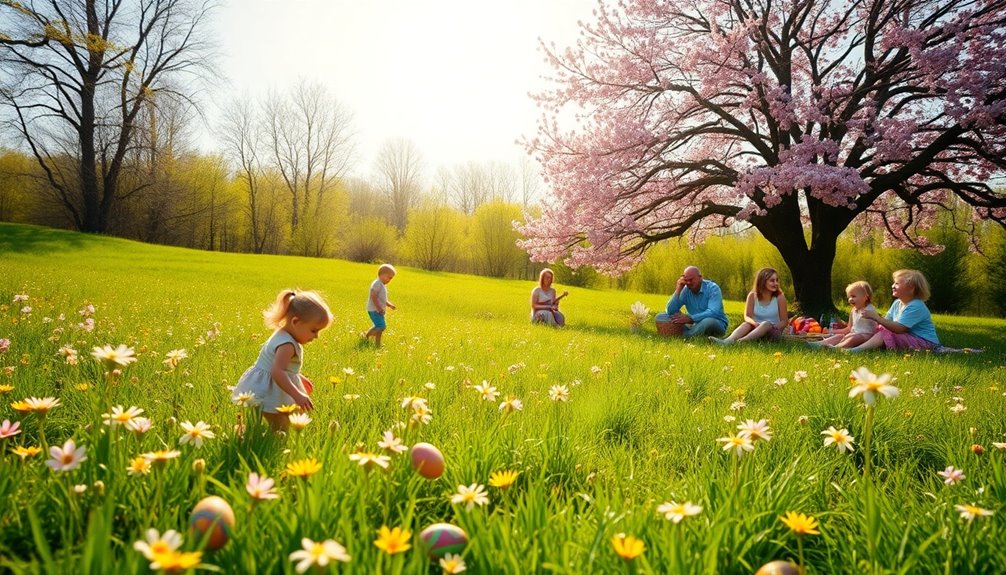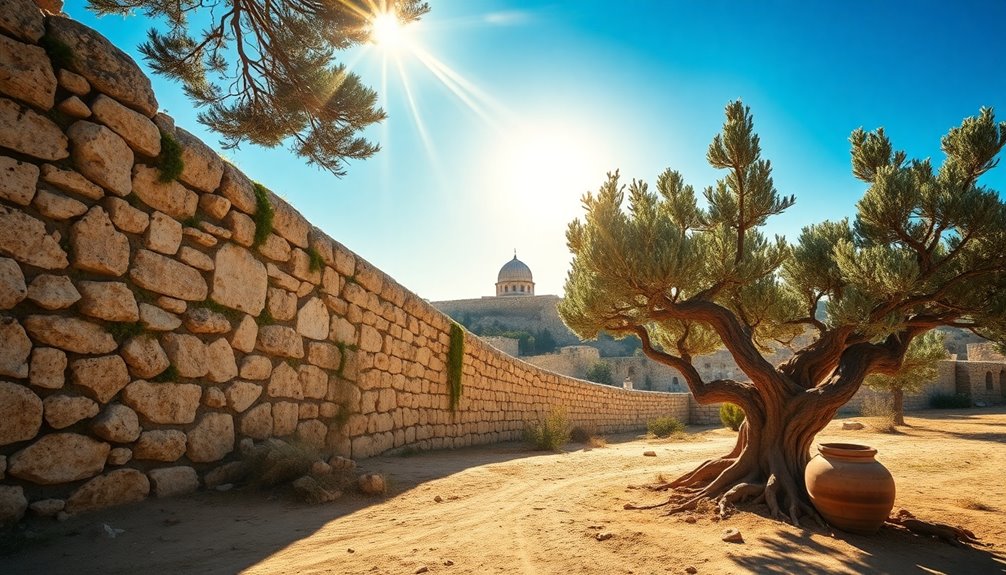Easter Monday marks the joyful celebration of Jesus' resurrection, a key event in Christian faith. Known as "Monday of the Angel," it commemorates the announcement of this momentous occasion by the angel at the empty tomb. This day offers communities the chance to come together through outdoor activities and family gatherings, from picnics to Easter egg hunts. While it's strongly rooted in Christian tradition, varying customs and practices can be found worldwide, highlighting its cultural richness. There's much more to explore about the traditions and significance of this holiday as communities celebrate renewal and togetherness.
Key Takeaways
- Easter Monday, also known as "Monday of the Angel," celebrates the announcement of Jesus' resurrection by the angel at the empty tomb.
- The holiday is not explicitly mandated in the Bible but symbolizes the core Christian belief in resurrection and eternal life.
- Historically observed since the 15th century, it holds significant religious importance primarily in Catholic and Eastern Orthodox traditions.
- Various cultural traditions, like "Wet Monday" in Poland, showcase the holiday's rich global observance and community engagement.
- Easter Monday encourages family gatherings and community service, fostering a spirit of renewal and charity among participants.
Introduction
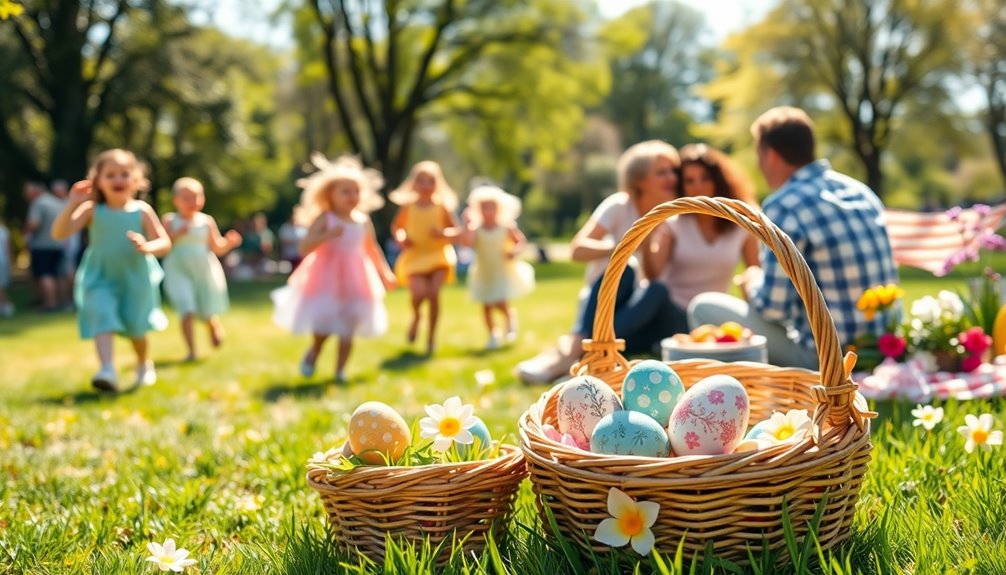
Easter Monday's significance often gets overshadowed by the grandeur of Easter Sunday, but it plays an important role in the celebration of Jesus Christ's resurrection. This day, known as "Monday of the Angel" in the Catholic tradition, commemorates the moment when an angel announced Christ's resurrection to the women at the tomb.
It's a continuation of the Easter festivities, allowing you to reflect on the resurrection's profound meaning.
In many countries, especially across Europe, Australia, and parts of South America, Easter Monday is recognized as a public holiday. This observance often includes various cultural festivities that highlight the significance of Easter within different communities.
While there's no biblical mandate for its observance, many cultures observe this day in unique ways—like Poland's Wet Monday, where water-dousing is a playful tradition.
As you engage with the celebrations, you'll find that the significance of Easter Monday lies not only in honoring the resurrection of Jesus Christ but also in fostering a sense of community and joy among believers.
Biblical Significance of Resurrection

The resurrection of Jesus is a cornerstone of the Christian faith, with primary Bible references like the Gospel of Matthew highlighting its significance.
You'll find that both primary and secondary references reinforce the message of hope and redemption through His rising.
Let's explore these key scriptures to understand their impact on Easter and beyond.
Primary Bible References
Throughout the Gospels, the resurrection of Jesus stands as a cornerstone of Christian faith, capturing the essence of hope and renewal. The Gospel of St. Matthew recounts the angel's announcement of this pivotal event, stating, "He isn't here, for he's been raised" (Matthew 28:5-7). This declaration highlights the angel's crucial role in proclaiming the resurrection, which is central to Christian teachings.
The empty tomb discovered by the women on Easter Sunday emphasizes the significance of Jesus' resurrection within the biblical narrative. It confirms his divine nature and the promise of eternal life for believers, making it a fundamental aspect of the faith.
Easter Monday, known as the "Monday of the Angel" in Catholic tradition, further underscores the importance of the angel's message, celebrating the triumph of Jesus over death.
Liturgical practices, such as the Regina Caeli prayer, reflect the joy and significance of this miraculous event. As you reflect on these primary Bible references, remember that the resurrection not only transformed the lives of the first followers of Christ but continues to inspire hope and faith in countless believers today.
Secondary Bible References
In examining the secondary Bible references, you'll find that the resurrection of Jesus holds profound significance across various scriptures. In the Gospel of Mark (16:1-8), the visit of Mary Magdalene and others to the tomb reveals an angel announcing that Jesus has risen, emphasizing the resurrection's pivotal role in the Easter narrative.
Similarly, in Luke (24:1-10), women discover the empty tomb, showcasing their crucial part in the resurrection story and early Christian testimony.
The apostle Paul stresses the importance of the resurrection in 1 Corinthians 15:14, asserting that without Christ's resurrection, preaching and faith lose their value, making it foundational for all Christian groups.
Moreover, the Book of Acts (2:31-32) highlights this event as a fulfillment of God's promise, with Peter affirming their witness to Jesus being raised to life.
Additionally, the Old Testament offers foreshadowing, as seen in Psalm 16:10, interpreted by early Christians as prophetic of Christ's resurrection.
This intertwining of scriptures throughout Holy Week emphasizes the deep religious significance of Easter Monday and the resurrection for believers today.
Easter Monday in Various Countries
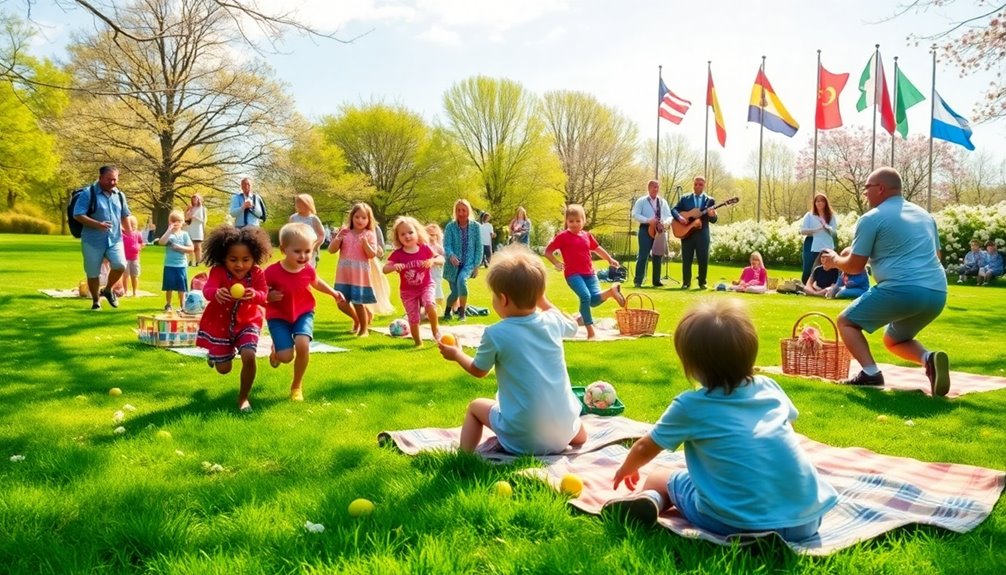
Easter Monday brings a variety of unique traditions and celebrations across different countries.
In Australia, it's a public holiday that often means family gatherings, picnics, and community events. Many people take advantage of this extended weekend for travel and leisure activities.
In Poland, Easter Monday is known as "Wet Monday" (Śmigus-Dyngus). Here, it's customary for people to pour water on each other, a playful tradition symbolizing purification and the arrival of spring.
Meanwhile, in Greece, you'll find outdoor picnics and feasts, marking the first day of Bright Week, which keeps the Easter excitement alive.
In some U.S. regions, especially within Polish communities, you can enjoy Dyngus Day on Easter Monday, featuring lively parades, music, and the beloved water-dousing tradition.
Many European countries, like Germany and the Netherlands, also observe Easter Monday as a public holiday, filled with outdoor activities, family time, and local customs, such as Easter egg-rolling competitions and festive parades.
No matter where you are, Easter Monday offers a rich tapestry of customs that reflect the culture and heritage of each country.
Cultural Traditions Around Easter
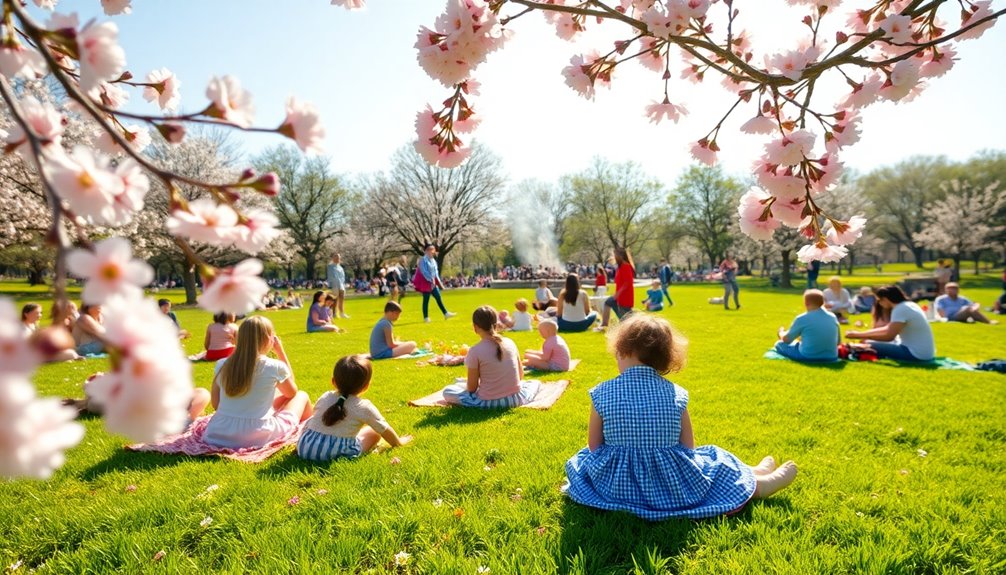
While many people associate Easter with the Sunday celebration of resurrection, the cultural traditions surrounding the entire Easter season, including Easter Monday, are rich and diverse. On this day, you might participate in outdoor processions or parades that keep the festive spirit alive.
In Poland, for example, Easter Monday, known as Wet Monday, involves young people playfully dousing each other with water. This fun tradition symbolizes renewal and the arrival of spring.
In the United States, you could celebrate Dyngus Day, where Polish heritage shines through lively polka music, delicious food, and water-throwing antics. Many cultures also enjoy Easter egg-rolling competitions on Easter Monday, which represents the rolling away of the stone from Jesus' tomb, adding a playful element to the day.
For members of the Eastern Orthodox community, Easter Monday marks the beginning of Bright Week, filled with joyful celebrations and special church services. Interestingly, this festive period can also be a time of emotional dysregulation, as individuals may experience varying levels of emotional responses during the celebrations.
These cultural traditions not only enhance the significance of Easter but also foster community spirit and connection. Embracing these diverse customs can deepen your appreciation for this special time of year.
Easter Monday's Historical Origins
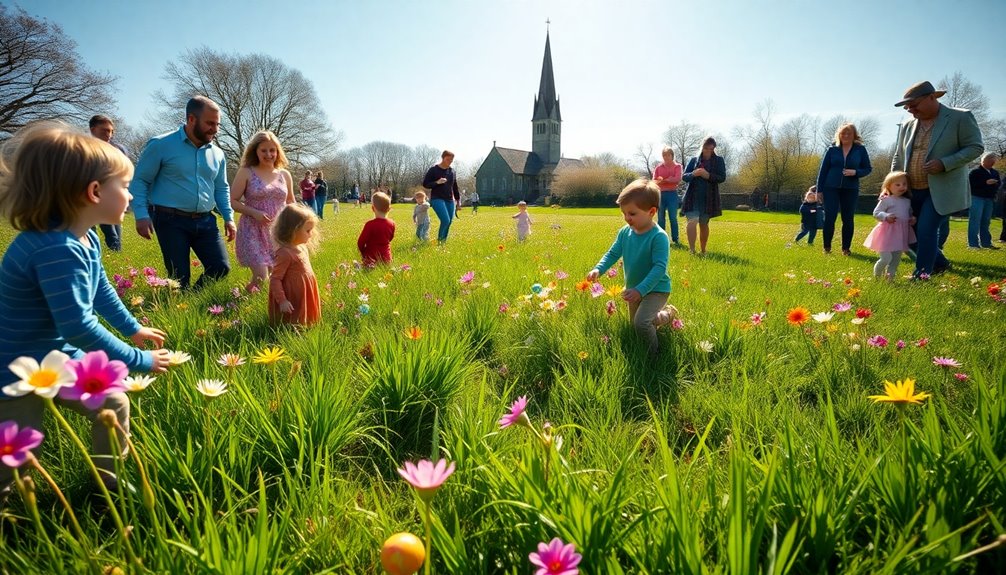
When you think about Easter Monday, it's important to recognize its rich historical background that counters common misconceptions.
While some may focus solely on the commercialization of the holiday, understanding its origins helps you appreciate its true significance.
Debunk Common Easter Misconceptions
Many people mistakenly believe that Easter Monday is simply an extension of the Easter holiday, but its historical origins reveal a deeper significance. This day, often called the "Monday of the Angel," marks the moment after the Resurrection of Jesus, celebrated by followers of Christ. The Gospel of St. Matthew recounts the angel announcing His resurrection, emphasizing the joy and hope that comes with it.
While Easter is a well-known religious holiday, Easter Monday has varying levels of observance across cultures. It first appeared in historical records during the 15th century, illustrating its established place within Easter Week and the liturgical calendar. Many communities, particularly within the Catholic Church and Eastern Orthodox traditions, observe it with communal prayers and gatherings.
It's important to note that, despite its strong ties to Christian customs, the Bible doesn't explicitly mandate Easter Monday's celebration. This flexibility allows for cultural variations and personal interpretations, contributing to unique local traditions.
Criticism of Easter's Commercialization
In recent years, the commercialization of Easter, including Easter Monday, has sparked significant criticism as it often overshadows the holiday's religious significance and historical origins. Many people feel that celebrating Easter has shifted from a spiritual observance to a consumer-driven event, where shopping and festive activities take center stage.
Traditional practices, like attending religious services or engaging in family gatherings, have been replaced by a focus on Easter-themed products, such as chocolate eggs and bunnies. Critics argue that this commercialization detracts from the original themes of renewal and resurrection that Easter represents.
As you navigate through the aisles filled with decorations and sweets, it's essential to recognize that these distractions can lead to a loss of understanding about the holiday's true meaning. The emphasis on consumerism can dilute the educational aspects tied to Easter's historical and cultural significance.
Despite these concerns, many still strive to reclaim Easter Monday by incorporating traditional practices into their celebrations. By prioritizing spiritual reflection and recognizing the roots of this holiday, you can help preserve its meaning amidst the overwhelming tide of commercialization.
Easter Monday Family Gatherings

Easter Monday is the perfect time for you and your family to bond through fun activities and community service initiatives.
Whether you're organizing an Easter egg hunt or volunteering together, these moments strengthen your connections and create lasting memories.
Embrace the opportunity to celebrate not just the holiday, but also the joy of being together.
Family Bonding Through Activities
Gather your family and embrace the joyful spirit of Easter Monday, a perfect opportunity for reconnecting and creating cherished memories together. This day is ideal for family gatherings, where you can celebrate the resurrection of Jesus Christ through fun communal activities. Traditional events like Easter egg hunts and rolling competitions foster bonding, making both children and adults feel connected.
Consider organizing outdoor picnics or barbecues, enjoying nature's beauty after the solemnity of Lent. These gatherings not only allow you to share delicious food but also provide a relaxed atmosphere for laughter and storytelling.
Don't forget about cultural practices like the playful water-dumping traditions seen in Poland, which add an element of fun and togetherness, reminding everyone of the joy this day brings.
Easter Monday serves as a continuation of the Easter festivities, allowing you to reflect on themes of renewal and joy. As you participate in these activities, you strengthen familial ties and create lasting memories that will be cherished for years to come.
Community Service Initiatives
While many families celebrate Easter Monday with joyful gatherings, it's also a perfect time to give back to the community. You can turn your family get-together into a community service initiative that not only strengthens bonds but also uplifts those around you. Consider volunteering together at local charities, where you can make a tangible impact.
Many communities organize events like food drives and park clean-ups on Easter Monday. Participating in these activities fosters a spirit of generosity and promotes community involvement. Why not bring your family to a local food drive? It's a great way to donate non-perishable items while teaching younger members the importance of helping others.
Some organizations and churches even host communal meals or picnics, encouraging attendees to bring donations for food banks or shelters. This creates a wonderful opportunity for families to share a meal while giving back.
Engaging youth in these service projects cultivates a sense of responsibility and encourages them to remain active in community service as they grow. Additionally, participating in such initiatives can help reinforce the importance of clear communication among family members as they work together towards a common goal. So, this Easter Monday, embrace the chance to make a difference while enjoying the company of your loved ones.
Easter Monday's Global Observance
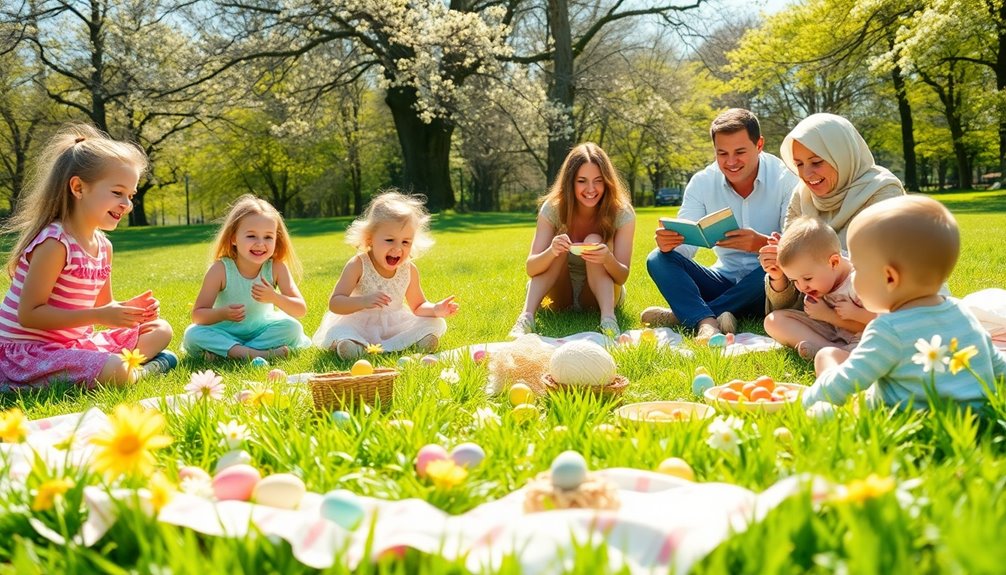
Across the globe, Easter Monday is celebrated in various ways, showcasing its cultural significance in different regions. In many countries, like Australia, Egypt, and parts of Europe, it's recognized as a public holiday. This highlights how deeply rooted Easter Monday traditions are in these cultures.
For instance, in Eastern Orthodox Christianity, it's known as Bright Monday, marking the start of Bright Week, filled with joyful celebrations and church services.
In the United States, observance is more limited, but some regions celebrate Dyngus Day, which features playful water-dousing traditions. Other cultures boast unique customs, like Poland's Wet Monday, where family members pour water on each other, while the UK enjoys outdoor egg-rolling competitions.
The celebration of Easter Monday varies widely. Some cultures engage in solemn remembrances and processions, while others emphasize joy, community gatherings, and festive activities.
This diversity in celebrations reflects the global observance of Easter Monday, reminding us of the rich tapestry of traditions that connect people across different backgrounds. Whether you're soaking in the joy or reflecting solemnly, Easter Monday invites you to partake in its cultural significance.
Additional Resources

To deepen your understanding of Easter Monday and its various customs, you can explore a variety of resources that shed light on this celebrated day.
Start with articles and books focusing on the Christian significance of Easter Monday, especially its connection to the resurrection of Jesus Christ. Websites dedicated to religious education often provide insights into how different denominations, including Eastern Orthodox Christians, observe this day, known as Bright Monday.
You might also find it helpful to look into cultural practices surrounding Easter Monday across various regions. These practices, such as water-dousing traditions and Easter egg games, highlight the themes of renewal and rebirth that resonate deeply with the holiday's significance.
Documentaries and videos can further illustrate the joyous celebrations associated with this day.
Finally, consider joining local community events or church services that celebrate Easter Monday. Engaging with others can enhance your appreciation of the diverse ways people commemorate this occasion.
Frequently Asked Questions
What Is Easter Monday Celebrated For?
Easter Monday's celebrated for a variety of reasons, primarily as a continuation of the Easter festivities.
You'll find communities engaging in joyful activities, from outdoor processions to egg-rolling competitions. It's a time to reflect on themes of renewal and joy, often marked by cultural traditions unique to each region.
While it's rooted in religious significance, many enjoy the day as a public holiday, blending both faith and fun in their celebrations.
What Is the Spiritual Meaning of Easter Monday?
The spiritual meaning of Easter Monday revolves around hope and renewal.
You reflect on the joy of resurrection, feeling a deeper connection to the themes of new life and spiritual rebirth.
This day invites you to celebrate Christ's victory over death, reinforcing your faith in salvation.
As you engage in communal prayers or personal reflection, you find encouragement in the promise of a renewed spirit and the joy that comes with it.
What Happened to Jesus on Easter Monday?
On Easter Monday, Jesus continued to appear to His disciples, reassuring and teaching them after His resurrection.
You'll find that these interactions were filled with healing and guidance as He prepared them for their mission.
The Gospels highlight His instructions to spread the message of hope and salvation.
You can see how this day symbolizes a deeper connection between Jesus and His followers, marking the start of a transformative period.
What Is the Difference Between Easter Sunday and Easter Monday?
Easter Sunday and Easter Monday differ mainly in their focus and activities.
On Easter Sunday, you celebrate the resurrection of Jesus with church services and special meals, marking a significant religious event.
In contrast, Easter Monday often involves more cultural festivities, like parades and picnics, allowing you to enjoy time with family and friends.
While Easter Sunday is deeply rooted in biblical significance, Easter Monday serves as a joyful continuation of the celebrations.

